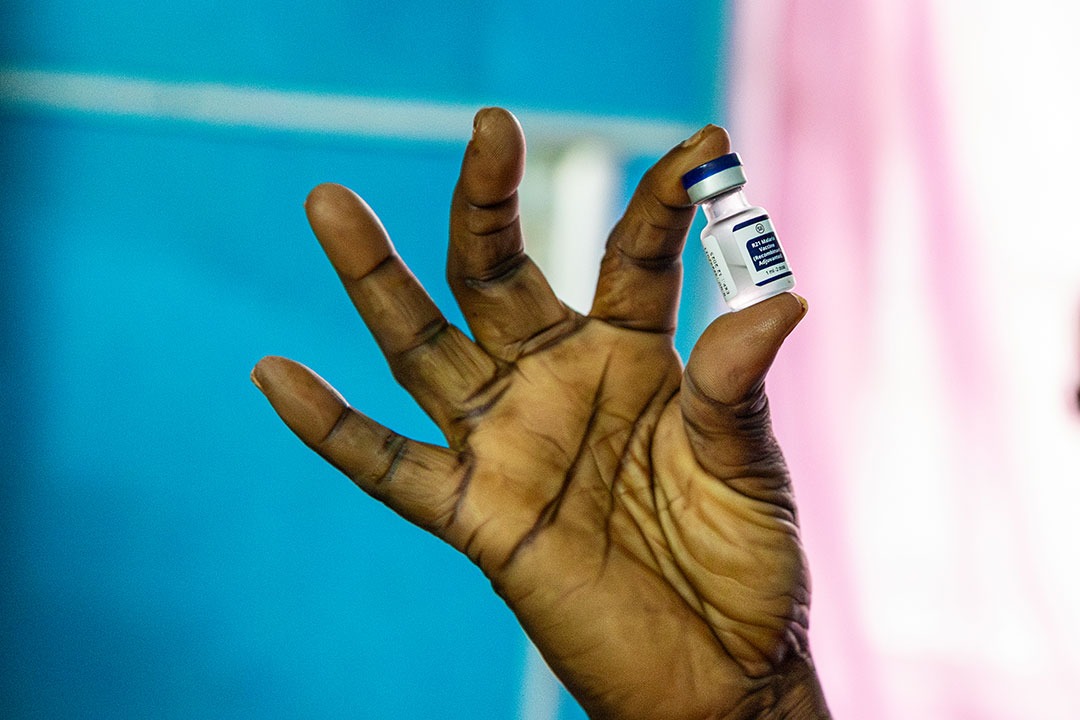
Juba, South Sudan, 16 July 2024 – In a historic move to combat the devastating impact of malaria, the Ministry of Health, in partnership with UNICEF, the World Health Organization (WHO) and Gavi, the Vaccine Alliance (Gavi), today launched the nationwide rollout of the R21 malaria vaccine. This landmark event marks a significant stride in the country's efforts to safeguard the health and well-being of its children.
The launch follows the arrival of the first consignment of over 645,000 doses of the R21 malaria vaccine in Juba on 31 May 2024. These vaccines will initially be distributed to the 28 counties with the highest malaria burden, with plans to scale up the rollout nationwide.
Malaria continues to be a leading cause of illness and death in South Sudan, particularly among young children. In 2022, the country reported an estimated 2.8 million cases and 6,680 deaths. With approximately 7,630 new cases and 18 fatalities daily, South Sudan has one of the highest malaria incidence rates in the region.
"Malaria is a major concern for our country. We are committed to reducing the impact of malaria and improving the health outcomes for our children," said Honourable Yolanda Awel Deng, Minister of Health. "The continued use of this vaccine, alongside other preventive measures such as insecticide-treated bed nets and timely access to medical care, will be instrumental in our efforts to eliminate malaria in South Sudan."
"The nationwide rollout of the malaria vaccine marks a significant milestone in South Sudan's journey to reduce the devastating burden of malaria and saving countless young lives. The development exemplifies how investments in health systems can yield significant benefits, ensuring that vaccines and other interventions reach those most in need. Together, we can build a stronger foundation for the health and well-being of future generations in South Sudan. We commend the Ministry of Health for their unwavering commitment to this cause," said Patience Musanhu, Gavi Senior Country Manager for South Sudan.
WHO recommends the RTS,S/AS01, and R21/Matrix-M vaccines to prevent malaria in children. The rollout of the RTS,S, and R21 malaria vaccines will ensure an adequate supply to meet demand, significantly benefiting children living in areas where malaria poses a major public health risk.
"The expanded availability of malaria vaccines heralds a new chapter in combating this deadly disease. Governments' proactive engagement and health systems' preparedness are pivotal in facilitating the successful rollout of the immunization programme. Training, communication strategies, and robust cold chain infrastructure are essential components in ensuring the widespread distribution of these important vaccines to protect the children of the country," said Hamida Lasseko, UNICEF South Sudan Representative.
"The rollout of the malaria vaccine is a game-changer in our fight against this deadly disease. With the support of our partners, we are committed to protecting young children and reducing the malaria burden in the country," said Dr Humphrey Karamagi, WHO Representative for South Sudan. "WHO AFRO has deployed experts to support the rollout, ensuring the effective introduction and distribution of the malaria vaccine by leveraging extensive expertise from prior vaccine initiatives within the region."
The joint efforts of the Ministry of Health, Gavi, UNICEF, WHO, and other health partners demonstrate the shared commitment to integrating these life-saving vaccines into the national immunization program. This milestone not only signifies progress in the battle against malaria but also underscores the collective dedication to safeguarding the health and well-being of children in South Sudan and beyond.
MEDIA CONTACTS
Jemila M. Ebrahim, WHO Communication Officer
+211 921 647 859
ebrahimj@who.int
Garang Abraham, UNICEF Communications
+211922583372
gdiit@unicef.org
Collins Weru Mwai, Gavi
+25 078 783 66 38
cmwai@gavi.org

